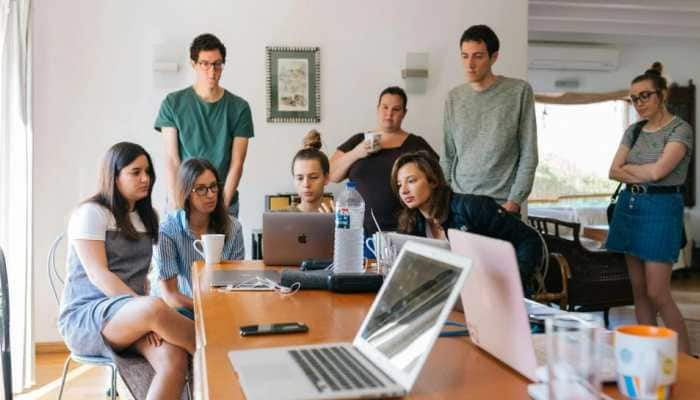`Obama’s foreign policies haven’t achieved notable successes`
Barack Obama became the first African-American President of US on Jan 20, 2009.
Trending Photos
)
 Riding high on the wave of optimism, Barack Obama became the first African-American President of the United States of America on January 20, 2009. Undoubtedly, he had a list of daunting tasks, but certainly, he was expected to handle each one of them with precision. Two years after he assumed office, he has some achievements to note and some failures to examine.
In an exclusive interview with Kamna Arora of Zeenews.com, American political scientist Rogers M Smith discusses Barack Obama’s performance two years after acquiring US Presidency, and his successes and failures.
Rogers M Smith is the Christopher H Browne Distinguished Professor and Chair of Political Science at the University of Pennsylvania.
Kamna: How do you rate Barack Obama`s performance as US President, two years on?
Smith: Obama has a number of major achievements in his first two years. His stimulus package probably saved the country from a major Depression. He achieved passage of the largest national extension of health coverage since Medicaid in the 1960s and the strongest financial industry regulatory bill since the New Deal, as well as ending the unfair "Don`t Ask, Don`t Tell" policy in the military. He has also overseen major new laws and programs protecting women and others against employment discrimination; regulating for food safety; extending unemployment benefits; and his Justice Department has undertaken new initiatives to combat racial discrimination and promote housing integration.
All these domestic initiatives have critics on the right and left, and his foreign policies have not produced any notable successes. Neither his wind-down of American involvement in Iraq nor his escalation of American presence in Afghanistan is working well. The persistence of high unemployment and the lack of foreign policy successes have hurt his popularity and he proved politically unable to prevent his party from suffering major mid-term election losses. But his overall record of achievements is still strong, and despite his diminished luster, he remains the most popular politician in the United States, likely to be re-elected in two years.
Kamna: The US President will now have to work with Republicans to pass the rest of his domestic legislative agenda. How difficult will it be for Barack Obama to reach his goals and find a common ground on key issues?
Smith: Very difficult, but the heart of Obama`s approach to politics is to strive for compromises that can win broad support but also move in what he regards as the direction of egalitarian social justice. It is likely that his visible efforts to do so will help him to maintain extensive popular support, even though he will have fewer legislative achievements than in his first two years.
Kamna: The US foreign policy has shifted in the wake of changing geopolitical calculus. Is it right to assess that the US is now trying to accommodate with the world’s rising powers, principally China and India, than containing them?
Smith: Accommodation can be seen as a form of containment. It is nonetheless true that the United States is now seeking to work with the world`s rising powers to find common ways forward, rather than direct itself the world`s path forward.
Kamna: The rising Islamic extremism in Pakistan and growing power of Taliban in Afghanistan indicate that Obama needs to reassess his Af-Pak policy. Comment.
Smith: True. Obama has done what he promised in regard to Afghanistan, increasing troops there, but so far he has little to show for it. The recent expressions of support for an assassin by Pakistan`s young but often extremist Islamic lawyers are disturbing confirmation that his policies are not preventing the rise of Islamic extremism in the region. This is the administration`s greatest foreign policy challenge and it is hard to see they have an answer to it.
Kamna: It’s not just al Qaeda now. Obama has home-grown terrorism and
polarisation to tackle in the US. How daunting is the task?
Smith: Despite the recent attempted assassination of a Congresswoman and the undeniable highly polarised state of American politics, home-grown terrorism is not a major problem -- significantly less than in Britain, much less than in volatile areas of the Middle East and, unfortunately, South Asia. America has survived eras of significantly greater political violence, and dealing with polarisation is one of Obama`s strengths.
Kamna: Obama`s Middle East policy is showing no results. Israel is defiant enough to upset the US with its continued settlements. What kind of adjustments does Mr President need to make to break an impasse in Mideast peace process?
Smith: There is no clear way forward and, like most Presidents, Obama can be expected to pursue major initiatives in the Middle East only in his second term.
Kamna: The nuclear proliferation dreams of Iran and North Korea are still giving Obama sleepless nights. Do you think Obama will be able to bring a change in this regard?
Smith: The administration will try all measures short of direct force to prevent the expansion of nuclear military capacities by these two nations, but America`s best hope in this regard is really that domestic conflicts will eventually bring new and more congenial leadership to power. US policy will seek to assist those developments to the limited degree it can.
Kamna: How do you measure the economic performance of Barack Obama?
Smith: High marks for stopping the downward spiral into a depression, but still a long way to go before he can be viewed as an economic success. That is also how he presents his record publicly; I think he`s right.
Kamna: Do you think the Obama administration is handling WikiLeaks fiasco well?
Smith: Secretary of State Clinton appears to have done a superb job of reassuring those foreign leaders who were upset by the leaks to the greatest degree possible, though of course not without some damage being done. The administration so far has avoided responding unduly repressively to these leaks. But that still remains to be seen, because it does have to take some actions to prevent the leaks from happening to the same extent again.
Riding high on the wave of optimism, Barack Obama became the first African-American President of the United States of America on January 20, 2009. Undoubtedly, he had a list of daunting tasks, but certainly, he was expected to handle each one of them with precision. Two years after he assumed office, he has some achievements to note and some failures to examine.
In an exclusive interview with Kamna Arora of Zeenews.com, American political scientist Rogers M Smith discusses Barack Obama’s performance two years after acquiring US Presidency, and his successes and failures.
Rogers M Smith is the Christopher H Browne Distinguished Professor and Chair of Political Science at the University of Pennsylvania.
Kamna: How do you rate Barack Obama`s performance as US President, two years on?
Smith: Obama has a number of major achievements in his first two years. His stimulus package probably saved the country from a major Depression. He achieved passage of the largest national extension of health coverage since Medicaid in the 1960s and the strongest financial industry regulatory bill since the New Deal, as well as ending the unfair "Don`t Ask, Don`t Tell" policy in the military. He has also overseen major new laws and programs protecting women and others against employment discrimination; regulating for food safety; extending unemployment benefits; and his Justice Department has undertaken new initiatives to combat racial discrimination and promote housing integration.
All these domestic initiatives have critics on the right and left, and his foreign policies have not produced any notable successes. Neither his wind-down of American involvement in Iraq nor his escalation of American presence in Afghanistan is working well. The persistence of high unemployment and the lack of foreign policy successes have hurt his popularity and he proved politically unable to prevent his party from suffering major mid-term election losses. But his overall record of achievements is still strong, and despite his diminished luster, he remains the most popular politician in the United States, likely to be re-elected in two years.
Kamna: The US President will now have to work with Republicans to pass the rest of his domestic legislative agenda. How difficult will it be for Barack Obama to reach his goals and find a common ground on key issues?
Smith: Very difficult, but the heart of Obama`s approach to politics is to strive for compromises that can win broad support but also move in what he regards as the direction of egalitarian social justice. It is likely that his visible efforts to do so will help him to maintain extensive popular support, even though he will have fewer legislative achievements than in his first two years.
Kamna: The US foreign policy has shifted in the wake of changing geopolitical calculus. Is it right to assess that the US is now trying to accommodate with the world’s rising powers, principally China and India, than containing them?
Smith: Accommodation can be seen as a form of containment. It is nonetheless true that the United States is now seeking to work with the world`s rising powers to find common ways forward, rather than direct itself the world`s path forward.
Kamna: The rising Islamic extremism in Pakistan and growing power of Taliban in Afghanistan indicate that Obama needs to reassess his Af-Pak policy. Comment.
Smith: True. Obama has done what he promised in regard to Afghanistan, increasing troops there, but so far he has little to show for it. The recent expressions of support for an assassin by Pakistan`s young but often extremist Islamic lawyers are disturbing confirmation that his policies are not preventing the rise of Islamic extremism in the region. This is the administration`s greatest foreign policy challenge and it is hard to see they have an answer to it.
Kamna: It’s not just al Qaeda now. Obama has home-grown terrorism and
polarisation to tackle in the US. How daunting is the task?
Smith: Despite the recent attempted assassination of a Congresswoman and the undeniable highly polarised state of American politics, home-grown terrorism is not a major problem -- significantly less than in Britain, much less than in volatile areas of the Middle East and, unfortunately, South Asia. America has survived eras of significantly greater political violence, and dealing with polarisation is one of Obama`s strengths.
Kamna: Obama`s Middle East policy is showing no results. Israel is defiant enough to upset the US with its continued settlements. What kind of adjustments does Mr President need to make to break an impasse in Mideast peace process?
Smith: There is no clear way forward and, like most Presidents, Obama can be expected to pursue major initiatives in the Middle East only in his second term.
Kamna: The nuclear proliferation dreams of Iran and North Korea are still giving Obama sleepless nights. Do you think Obama will be able to bring a change in this regard?
Smith: The administration will try all measures short of direct force to prevent the expansion of nuclear military capacities by these two nations, but America`s best hope in this regard is really that domestic conflicts will eventually bring new and more congenial leadership to power. US policy will seek to assist those developments to the limited degree it can.
Kamna: How do you measure the economic performance of Barack Obama?
Smith: High marks for stopping the downward spiral into a depression, but still a long way to go before he can be viewed as an economic success. That is also how he presents his record publicly; I think he`s right.
Kamna: Do you think the Obama administration is handling WikiLeaks fiasco well?
Smith: Secretary of State Clinton appears to have done a superb job of reassuring those foreign leaders who were upset by the leaks to the greatest degree possible, though of course not without some damage being done. The administration so far has avoided responding unduly repressively to these leaks. But that still remains to be seen, because it does have to take some actions to prevent the leaks from happening to the same extent again.







)
)
)
)
)
)
)
)
)
)
